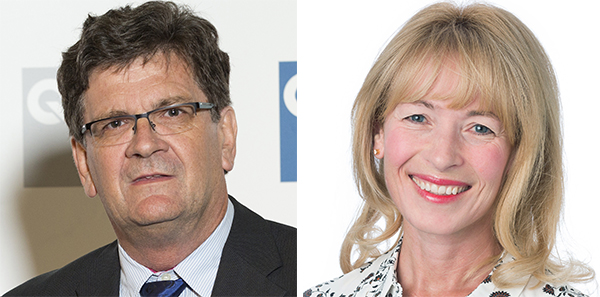1:30min

Associate Professor Peter Hendicott and Associate Professor Sharon Bentley Image: QUT and Vision Australia
______________________________
By Rhiannon Riches
Assistant Editor
Associate Professor Sharon Bentley has been appointed the new Head of the School of Optometry and Vision Science at QUT, following the retirement of Associate Professor Peter Hendicott.
Professor Bentley will take up the position in February, leaving her current post as Director of Clinical Services at Australian College of Optometry in Melbourne.
‘The School of Optometry and Vision Science at QUT has a strong team with an excellent reputation in teaching and learning and a successful track record in research. I very much look forward to the opportunity to support them in every way possible,’ Professor Bentley said.
Over her career, Professor Bentley has held a series of academic, research and management positions. She is currently Honorary Principal Fellow at The University of Melbourne, where she began her optometry education with a Bachelor of Science (1988), Master of Optometry (1997) and Doctor of Philosophy (2000).
Professor Bentley completed post-Doctoral research in visual function in glaucoma, in Canada, before completing a Master of Public Health at Johns Hopkins University in Baltimore in 2011. Returning to Australia, she was appointed head of pre-residential clinical skills training and senior lecturer in optometry at Deakin University, a position she held from 2011 to 2014.
For the past three years, she has been part of the executive management team at ACO, directing clinical services for people experiencing disadvantage and clinical placements for optometry students, while continuing teaching and research at The University of Melbourne. This year she completed the Graduate Company Directors Course at the Australian Institute of Company Directors.
‘Perhaps my most prestigious award to date is a Churchill Fellowship in 2010,’ she said.
Professor Bentley is a Fellow of the American Academy of Optometry (Diplomate in Low Vision) and of the Australian College of Optometry.
Peter Hendicott
Professor Hendicott joined QUT as a full-time academic in 2007 and took over from Professor Leo Carney in 2008 as Head of School.
A new course structure implemented in 2008 has been one of the most significant changes in his time as head. Parallel with this was the finalisation of the redevelopment of the QUT Optometry Clinic in a purpose built multi-disciplinary clinic building on campus.
‘We changed the program from a four-year Bachelor Degree to a five-year Bachelor/Masters. We were the first university to put forward the three-plus-two-year Bachelor/Masters structure,’ he said.
‘It was a response to the developments in therapeutic scope of practice, and the need to incorporate this as part of the entry-level program. We felt we had justification to link that component as a Master-level qualification. Course changes to include therapeutics had also happened at The University of Melbourne and the University of New South Wales.
‘It took over a year to get approval through QUT to commence this structure from 2009, with later external accreditation by the Optometry Council of Australia and New Zealand. We have this year just completed QUT’s internal five-year re-accreditation review of the program.’
The change in course structure influenced change in other areas. ‘With a new course program, the school was successful in arguing that we needed to increase staff members and to strengthen our school’s clinical component,’ he said.
Professor Hendicott said the change in the course structure brought about change in the way students gained clinical experience.
‘Under the previous four-year course structure, students were gaining clinical skills parallel with their first exposure to patients. Since introducing the five-year course structure, students have been able to improve their clinical skills foundation prior to clinical patient care,’ he said.
‘We were able to increase the amount of time spent in off-campus clinical placements. Under the new structure, some students have the opportunity to spend a semester at the University of Waterloo in Canada to gain further clinical experience; others seek opportunities in Indigenous communities, in refugee communities, as well as in optometry and ophthalmology practices.
‘We’ve been able to broaden our outreach programs, and offer students greater flexibility in clinical placements. We encourage students to think sideways. As an example, for a number of years a group of students have been assisting in Volunteer Optometric Services to Humanity programs in Mexico. This was a student-led initiative, and with the course change, we have subsequently been able to include this as a clinical placement activity.’
Award-winning staff
Professor Hendicott said the recognition of QUT’s accomplished, award-winning optometry teaching staff was a highlight of his tenure as Head of School.
‘Academic optometry is a small world,’ he said. ‘On our staff, we have recipients of the Glenn A Fry Award, H Barry Collin Research Medal winners, a Companion of the Order of Australia in Professor Nathan Efron, and an Honorary Doctor of Science from Aston University in the UK, awarded to Professor Joanne Wood this year.
‘These are high-calibre research-based awards. It says something about the culture of the school that Ken Bowman and Leo Carney built, and we’ve tried to continue,’ Professor Hendicott said.
‘We have an excellent group of staff members who work hard and ably. Our staff makes a solid, high-level contribution, and it’s been great to work with them and share their success. The calibre of their work is what leads to success.’
Although retiring as Head of School, Professor Hendicott will continue to be involved in the profession. He remains chairman of the OCANZ board of directors, a position he will continue to hold for another two years in accordance with the terms of the board.
Since October, he has been chairman of the World Council of Optometry’s Education Subcommittee, and in January, he will preside over the Asia Pacific Optometry Council, having served as vice-president for the past two years.